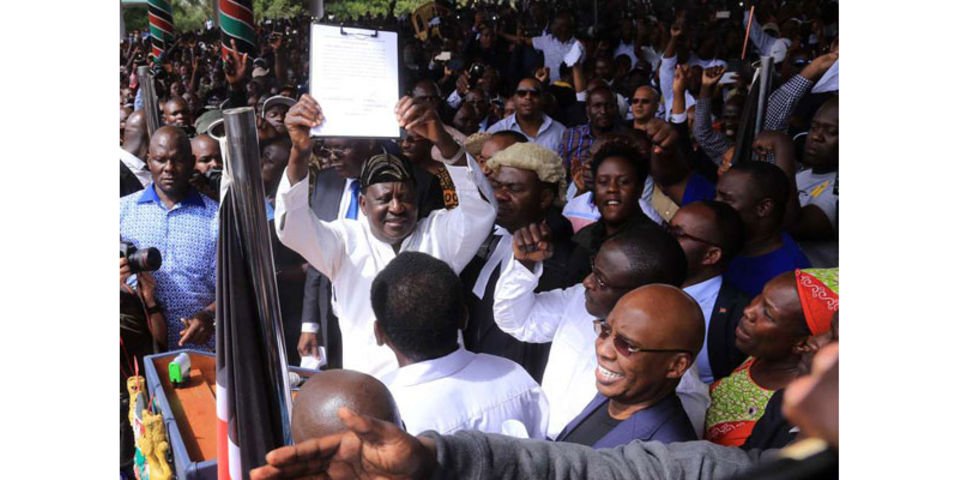On this day three years ago, ODM leader Raila Odinga was ‘sworn in’ as ‘ the people’s president’ in defiance of the 2017 controversial election.
Mr Odinga, ‘inaugurated’ himself in the presence of thousands of supporters in Uhuru Park, Nairobi ignoring a government warning that the ceremony amounted to treason.
Asanteni kwa kusimama imara na sisi pic.twitter.com/6wCxPGsm1s
— Raila Odinga (@RailaOdinga) January 30, 2018
“I Raila Amolo Odinga, in full realisation of the high calling, assume the office of the People’s President of the Republic of Kenya,” he said in an oath administered by Ruaraka MP Tom Kajwang’ and lawyer Miguna Miguna.
National Super Alliance (Nasa) principals including Kalonzo Musyoka, Musalia Mudavadi and Moses Wetang’ula were absent during the event which took less than 10 minutes.
“We have accomplished our promise to Kenyans,” said Mr Odinga before leaving hurriedly.

Immediately after taking the oath, Mr Odinga’s official Twitter account was updated to read: “This is the official account of His Excellency Raila Amolo Odinga, President of the Republic of Kenya.”
The ceremony followed hours of uncertainty as supporters waited in the baking sun and commentators speculated over whether Mr Odinga would actually go through with the “inauguration” that was already delayed in December.
It also came as outrage hit the media after the government allegedly warned broadcasters not to cover the event, and pulled major television network Citizen TV off the air mid-morning, while also blocking transmitters of NTV.
After the mock inauguration, the then Attorney-General Githu Muigai warned that the ODM leader could be charged with treason, an offence which is punishable by death.
“The swearing in of any person not lawfully declared to have won an election by the independent election and boundaries commission, and the swearing in that is not conducted by the chief justice of the Republic of Kenya is a process wholly unanticipated by the constitution and is null and void and illegal,” Mr Muigai said.
“The criminal law of the Republic of Kenya, in Article 40 of the penal code provides or stipulates that that sort of process, is high treason,” the AG added.
But the authorities failed to make good their threats to arrest Mr Odinga and charge him with treason.
Instead, Ruaraka MP Tom Kajwang’ was arrested and charged with charges of treason and taking part in unlawful assembly.
Mr Miguna was also arrested and deported to Canada on allegations that he is not a Kenyan citizen.

In November 2019, while acquitting Mr Kajwang’, the courts ruled that Mr Odinga’s swearing-in was not illegal.
Chief Magistrate Stephen Mbungi ruled that the oath taken was not unlawful, and that Mr Odinga would have only been held responsible if he used his swearing-in to commit a crime.
“From the content of the oath, Hon Raila Odinga swore himself to the office of the people’s president which does not amount to any crime. He would have only breached the law if he swore himself as the president of the Republic of Kenya,” ruled Mr Mbungi.
The chief magistrate argued that the swearing-in would have only amounted to treason if Mr Odinga and the organisers of the event declared their intention to overthrow the Government.
“The oath does not talk of the people’s president of the Republic of Kenya. It only talks of the President of the Republic of Kenya. It was not unlawful for it did not bind Mr Odinga to commit any crime or did he swear himself to a lawfully established office when not qualified for it,” the magistrate noted.
Handshake
About a month after the swearing in ceremony, Mr Odinga and his political enemy President Uhuru Kenyatta met for the first time in public and shook hands in the famous handshake of March 9, 2018 in which they vowed to put their political differences aside.
The Handshake was followed by the Building Bridges Initiative (BBI) whose report will be subjected to a referendum vote later this year.
Credit: Source link